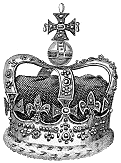Definify.com
Webster 1913 Edition
Monde
‖
Monde
(môNd)
, Noun.
[F. See
Mundane
.] The world; a globe as an ensign of royalty.
[R.]
A. Drummond.
Webster 1828 Edition
Monde
MONDE
,Noun.
Definition 2026
Monde
monde
monde
English

the monde is the ball below the cross
Noun
monde
- A ball-like object, located near the top of a crown, symbolizing the globe.
- 1754, Alexander Drummond, Travels through different cities of Germany, Italy, Greece and several parts of Asia as far as the banks of the Euphrates
- Jesus Christ is represented as a lad about twelve years old, in a tunic and robe of brocade, with a full, fair wig, a gold crown much larger than the head, and a monde in his hand.
- 1754, Alexander Drummond, Travels through different cities of Germany, Italy, Greece and several parts of Asia as far as the banks of the Euphrates
See also
References
- monde in Webster’s Revised Unabridged Dictionary, G. & C. Merriam, 1913
French
Pronunciation
- IPA(key): /mɔ̃d/
Etymology 1
Noun
monde m (plural mondes)
- world
- C'est la plus belle fille du monde.
- She is the most beautiful girl in the world.
- C'est la plus belle fille du monde.
- people
- Le monde m'agace quelquefois. - People annoy me sometimes.
- La salle était noire de monde. - The room was crowded. or The room was full of people.
Related terms
- le monde entier
- mondial
- tiers-monde
- tout le monde
Etymology 2
From Latin mundus (“pure; clean”).
Adjective
monde m, f (plural mondes)
Antonyms
Anagrams
Middle French
Etymology 1
Old French < Latin mundus (“world”).
Noun
monde m (plural mondes)
- the world
Etymology 2
Adjective
monde m, f (plural mondes)
Descendants
- French: monde
Old French
Etymology 1
Alternative forms
Noun
monde m (oblique plural mondes, nominative singular mondes, nominative plural monde)
- the world
Descendants
Etymology 2
Adjective
monde m (oblique and nominative feminine singular monde)
Descendants
- French: monde
Spanish
Verb
monde
- Formal second-person singular (usted) imperative form of mondar.
- First-person singular (yo) present subjunctive form of mondar.
- Formal second-person singular (usted) present subjunctive form of mondar.
- Third-person singular (él, ella, also used with usted?) present subjunctive form of mondar.